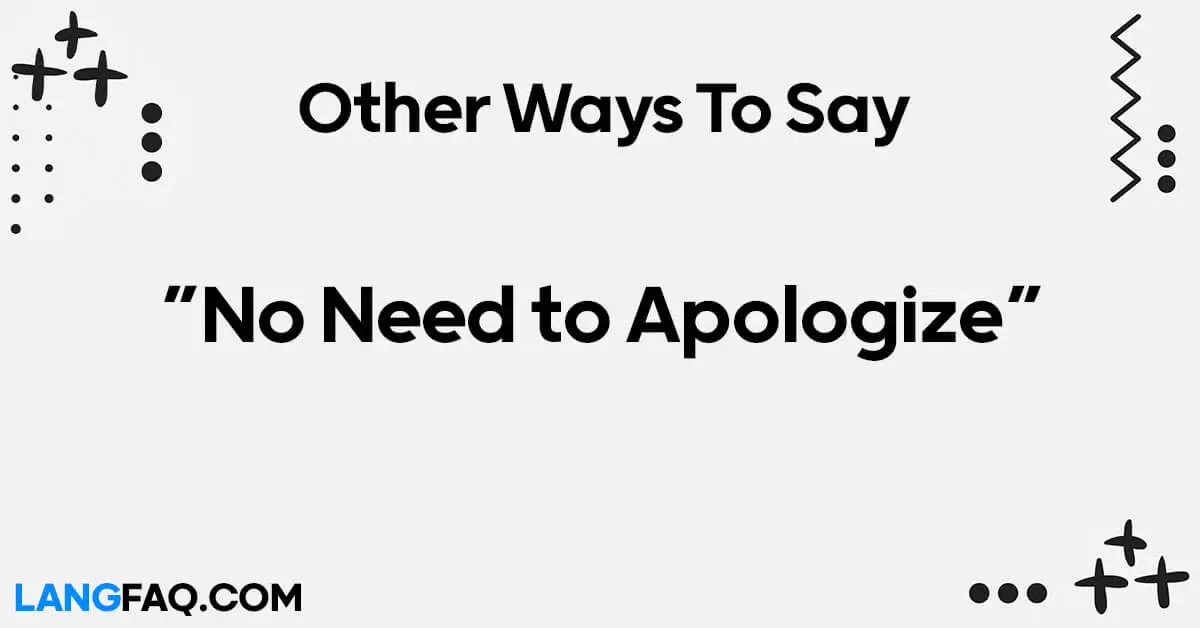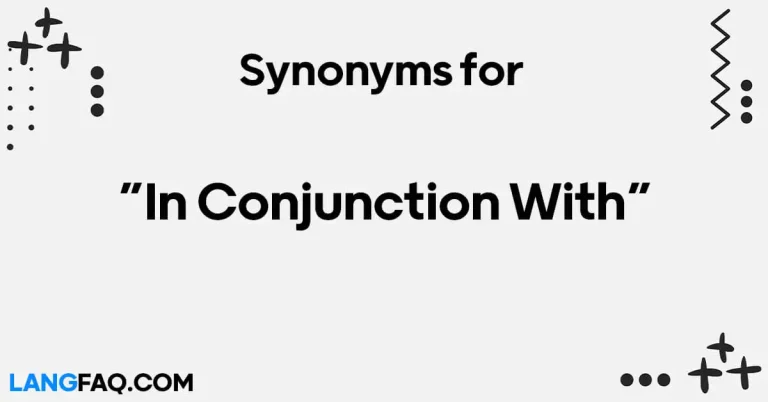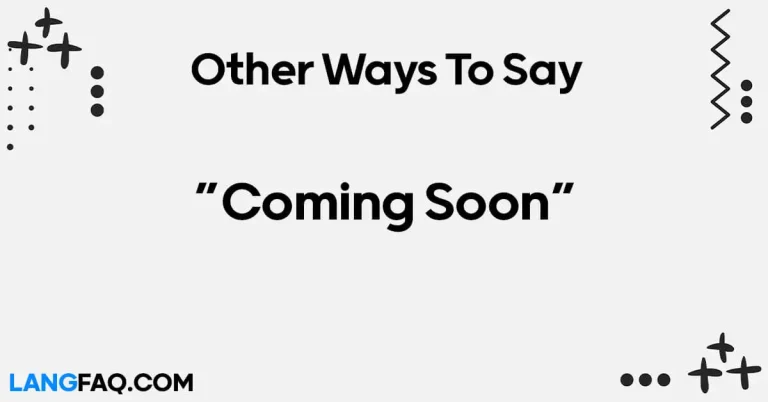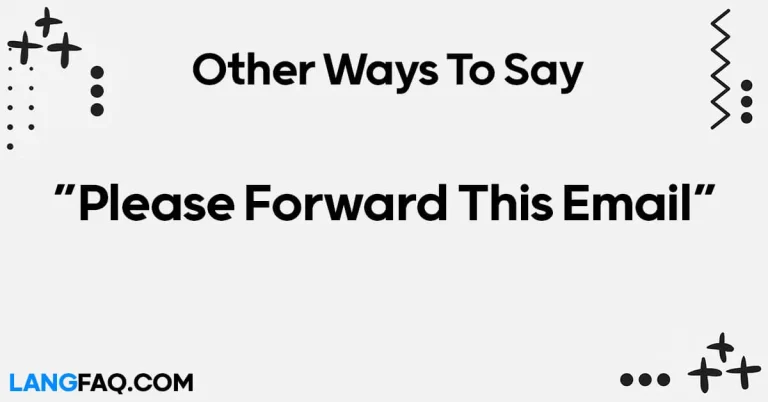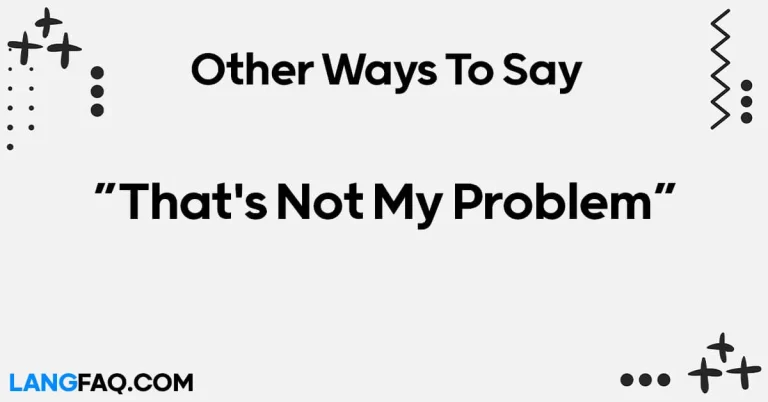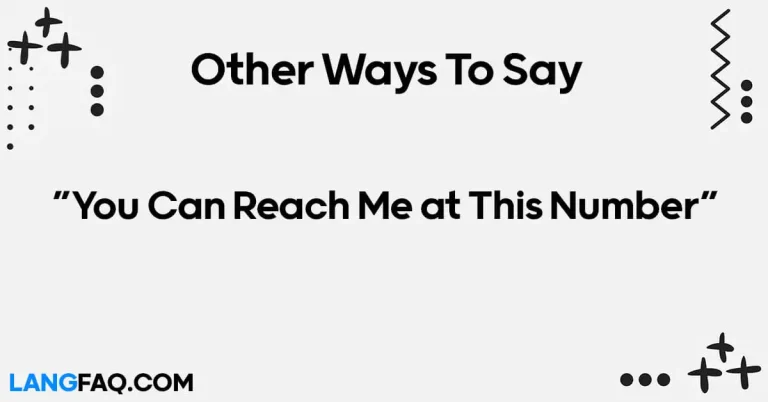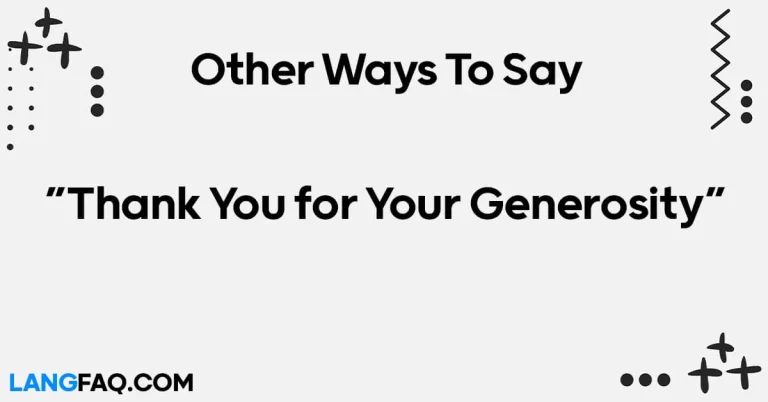Welcome to the realm of effective communication, where the art of expressing oneself without apology takes center stage. In this article, we delve into “12 Other Ways to Say ‘No Need to Apologize,'” offering a comprehensive guide to fostering understanding and empathy in your interactions. Whether you seek alternatives for professional settings or personal relationships, these alternatives will elevate your communication game.
12 Other Ways to Say “No Need to Apologize”
Here are 12 alternative ways to express “No Need to Apologize”:
- You’re not alone in this.
- No harm done.
- Let’s move forward positively.
- I appreciate your honesty.
- Your perspective is valued.
- No need for apologies here.
- I accept your decision gracefully.
- Mistakes happen; let’s learn.
- Thank you for your candor.
- Your understanding is enough.
- I value our relationship over apologies.
- Let’s focus on the solution, not blame.
Here’s a table with meanings and examples for the alternative ways to express “No Need to Apologize”:
| Alternative Phrase | Meaning | Example |
|---|---|---|
| You’re not alone in this. | Expressing solidarity and support. | “Facing challenges is tough, but you’re not alone in this.” |
| No harm done. | Assuring that no damage or offense occurred. | “I appreciate your concern, but really, no harm done.” |
| Let’s move forward positively. | Encouraging a positive outlook and progress. | “Instead of dwelling on the mistake, let’s move forward positively.” |
| I appreciate your honesty. | Acknowledging and valuing honesty. | “I appreciate your honesty in sharing your thoughts with me.” |
| Your perspective is valued. | Highlighting the importance of differing views. | “Your perspective is valued, and it adds depth to our discussion.” |
| No need for apologies here. | Indicating a forgiving and understanding stance. | “No need for apologies here; let’s focus on finding a solution.” |
| I accept your decision gracefully. | Acknowledging and respecting someone’s choice. | “I may not agree, but I accept your decision gracefully.” |
| Mistakes happen; let’s learn. | Emphasizing a constructive approach to errors. | “It’s okay; mistakes happen. Let’s learn from this experience.” |
| Thank you for your candor. | Appreciating openness and honesty. | “Thank you for your candor; it helps in understanding your perspective.” |
| Your understanding is enough. | Conveying appreciation for comprehension. | “You may not agree, but your understanding is enough for me.” |
| I value our relationship over apologies. | Prioritizing the relationship over mistakes. | “Our bond is more important to me than seeking constant apologies.” |
| Let’s focus on the solution, not blame. | Encouraging problem-solving and collaboration. | “Instead of blaming, let’s focus on finding a solution together.” |
These alternative phrases provide a diverse set of expressions that convey understanding and empathy without resorting to traditional apologies. Whether in personal relationships or professional settings, incorporating these alternatives fosters positive communication and promotes a culture of mutual respect.
Is It Correct to Say “No Need to Apologize”?
Absolutely! “No need to apologize” is a perfectly correct and widely used phrase in the English language. This expression is employed to convey that there is no requirement or expectation for someone to offer an apology. It’s a friendly and reassuring way to let someone know that their actions or words are understood, and there is no perceived wrongdoing.
When to Use “No Need to Apologize”:
- Informal Settings:
- Scenario: A friend arrives slightly late to a casual gathering.
- Usage: “Hey, no need to apologize! We’re just glad you made it.”
- Professional Environments:
- Scenario: A colleague expresses concern about a minor oversight.
- Usage: “No need to apologize; these things happen. Let’s work together to fix it.”
- Personal Relationships:
- Scenario: Your partner apologizes for a small mistake.
- Usage: “No need to apologize, love. It’s not a big deal. Let’s move forward positively.”
- Conflict Resolution:
- Scenario: Resolving a disagreement with a friend.
- Usage: “I understand your perspective, and there’s no need to apologize. Let’s find common ground.”
Grammar and Usage Insights:
- Formality: The phrase is versatile and can be used in both formal and informal contexts.
- Politeness: It conveys a sense of understanding and often serves to reassure the other person, maintaining a positive tone.
- Alternatives: While “No need to apologize” is clear and concise, variations like “Apologies not necessary” or “You don’t have to apologize” can be used interchangeably.
Pros and Cons:
Pros:
- Positive Tone: It maintains a positive and supportive communication atmosphere.
- Reassurance: Offers reassurance to the other person, minimizing any potential discomfort.
Cons:
- Overuse: Constantly saying “No need to apologize” might seem insincere if the situation calls for a genuine apology.
Tips for Usage:
- Sincerity Matters: Ensure that when using this phrase, it aligns with the context and genuinely reflects your understanding.
- Encourage Open Communication: Utilize the phrase to encourage open dialogue, emphasizing understanding over blame.
Professional Mail Example With “No Need to Apologize”
Subject: Clarification on Project Timeline
Dear [Recipient’s Name],
I hope this email finds you well. I wanted to address the recent concerns you raised regarding the project timeline. After reviewing your points, I want to emphasize that there is no need to apologize for bringing these matters to my attention.
Your dedication to ensuring the success of our projects is highly appreciated. It’s crucial that we have open communication channels to address any potential challenges promptly. Your insights are valuable, and I encourage this level of diligence.
Let’s schedule a brief meeting this week to discuss the specific areas you mentioned and strategize on how we can overcome any potential hurdles. Your proactive approach is commendable, and I believe working together on solutions will lead to an even more successful project outcome.
Thank you for your dedication to our shared goals, and I look forward to collaborating with you to ensure the project’s success.
Best regards,
[Your Full Name] [Your Position] [Your Company] [Contact Information]
1. You’re not alone in this.
Expressing solidarity and support is a vital aspect of effective communication, and saying “You’re not alone in this” is a powerful way to convey understanding. This phrase can be used in various scenarios, from consoling a friend going through a tough time to supporting a colleague facing professional challenges.
When to Use:
- In a personal context: When consoling a friend or family member facing difficulties.
- In a professional context: When a colleague is dealing with a challenging project.
Example Sentence: Colleague: “I’m struggling to meet the deadline for this project.”
You: “I understand it’s tough, but remember, you’re not alone in this. We’re a team, and we’ll find a solution together.”
Email Sample:
*Subject: Team Support – We’ve Got This!
Hi [Colleague’s Name],
I heard about the challenges you’re facing with the project deadline. I want you to know that you’re not alone in this. We’re a team, and together, we’ll navigate through this and find success. Let’s discuss and plan our next steps.
Best regards,
[Your Name]*
Variations:
- In a mentor-mentee context: “As your mentor, I want you to know you’re not alone in facing these challenges. Let’s work through them together.”
2. No harm done.
Assuring that no damage or offense occurred is crucial, especially when someone feels the need to apologize for a perceived mistake. “No harm done” communicates that the situation is not as dire as they might think and helps maintain a positive atmosphere.
When to Use:
- In an informal context: When a friend apologizes for a minor inconvenience.
- In a professional context: When addressing a colleague’s concern about a minor mistake.
Example Sentence: Friend: “I’m sorry I’m late; traffic was terrible.”
You: “No harm done! I’m just glad you’re here.”
Email Sample:
*Subject: No Worries – We’re Good!
Hi [Friend’s Name],
No harm done regarding your delay; I completely understand traffic can be unpredictable. Let’s catch up soon.
Best,
[Your Name]*
Variations:
- In a professional context: “No harm done; let’s focus on finding a solution rather than dwelling on the mistake.”
3. Let’s move forward positively.
Encouraging a positive outlook is essential, especially in professional settings. Saying “Let’s move forward positively” shifts the focus from the past mistake to future solutions, fostering a constructive atmosphere.
When to Use:
- In a professional context: After addressing and acknowledging a mistake in a team project.
- In a personal context: When resolving a disagreement with a friend.
Example Sentence: Team Meeting: “We encountered challenges in the last project, and I apologize for the oversight.”
You: “No need to dwell on it; let’s move forward positively. What can we learn, and how can we improve for the next project?”
Email Sample:
*Subject: Moving Forward Together
Hi Team,
Acknowledging the challenges we faced in the previous project, let’s move forward positively. I believe we can turn this experience into an opportunity for growth. Let’s discuss our strategies in our upcoming meeting.
Best,
[Your Name]*
Variations:
- In a personal context: “Let’s move forward positively and focus on our friendship rather than the disagreement.”
4. I appreciate your honesty.
Acknowledging and valuing honesty is crucial for building trust in relationships. Saying “I appreciate your honesty” not only recognizes the sincerity of the other person but also encourages open communication.
When to Use:
- In a personal context: When a friend admits to a mistake.
- In a professional context: When a colleague confesses to an error.
Example Sentence: Colleague: “I need to confess; I made an error in the report.”
You: “I appreciate your honesty. Let’s work together to rectify it.”
Email Sample:
*Subject: Appreciation for Open Communication
Hi [Colleague’s Name],
I appreciate your honesty in bringing the error in the report to my attention. It shows your commitment to maintaining high standards. Let’s collaborate on correcting it.
Best,
[Your Name]*
Variations:
- In a mentor-mentee context: “I appreciate your honesty; it’s a crucial aspect of your growth and development.”
5. Your perspective is valued.
Highlighting the importance of differing views fosters an inclusive and respectful environment. Saying “Your perspective is valued” encourages diverse opinions and promotes collaboration.
When to Use:
- In a team discussion: Acknowledging a colleague’s unique viewpoint.
- In a personal conversation: Recognizing and appreciating a friend’s differing opinion.
Example Sentence: Friend: “I don’t necessarily agree with your approach.”
You: “I respect that; your perspective is valued. Let’s explore both viewpoints.”
Email Sample:
*Subject: Valuing Diverse Perspectives
Hi Team,
In our recent discussion, diverse perspectives emerged. I want to emphasize that each viewpoint is valued, contributing to our collective success. Let’s continue fostering an environment of open dialogue.
Best,
[Your Name]*
Variations:
- In a mentor-mentee context: “Your perspective is valued, and it adds depth to our discussions. Keep sharing your insights.”
6. No need for apologies here.
Indicating a forgiving and understanding stance is essential, and saying “No need for apologies here” reassures the other person that forgiveness is granted without the necessity for constant apologies.
When to Use:
- In a personal context: When a friend keeps apologizing for a minor inconvenience.
- In a professional context: When a colleague excessively apologizes for a minor mistake.
Example Sentence: Colleague: “I’m sorry for interrupting your work.”
You: “No need for apologies here; we’re all working together.”
Email Sample:
*Subject: No Apologies Necessary
Hi [Colleague’s Name],
I noticed you’ve apologized a few times for minor things. Please know there’s no need for apologies here; we’re a supportive team working collaboratively.
Best,
[Your Name]*
Variations:
- In a mentor-mentee context: “No need for apologies here; focus on learning and growing.”
7. I accept your decision gracefully.
Acknowledging and respecting someone’s choice is crucial in both personal and professional settings. Saying “I accept your decision gracefully” shows maturity and helps maintain a positive relationship.
When to Use:
- In a personal context: When a friend makes a decision you may not agree with.
- In a professional context: Accepting a team decision, even if it differs from your opinion.
Example Sentence: Friend: “I’ve decided to pursue a different career path.”
You: “I accept your decision gracefully. I wish you all the best in your new journey.”
Email Sample:
*Subject: Acknowledging Your Decision
Hi [Friend’s Name],
I’ve heard about your decision, and I want you to know that I accept it gracefully. Your happiness and fulfillment matter the most. Let’s catch up soon.
Best,
[Your Name]*
Variations:
- In a mentor-mentee context: “I accept your decision gracefully and trust in your ability to make the right choices for your career.”
8. Mistakes happen; let’s learn.
Emphasizing a constructive approach to errors is vital for personal and professional growth. Saying “Mistakes happen; let’s learn” encourages a mindset focused on improvement rather than dwelling on blame.
When to Use:
- In a professional context: Addressing a team mistake and planning for improvement.
- In a personal context: Navigating through a misunderstanding with a friend.
Example Sentence: Team Meeting: “We encountered setbacks in the project.”
You: “Mistakes happen; let’s learn from them and strategize for a more successful outcome next time.”
Email Sample:
*Subject: Learning from Challenges
Hi Team,
Our recent project faced challenges, and that’s okay. Mistakes happen; let’s learn from them and use this experience to enhance our future endeavors.
Best,
[Your Name]*
Variations:
- In a mentor-mentee context: “Mistakes are part of the learning process; let’s navigate through them together.”
9. Thank you for your candor.
Appreciating openness and honesty in communication is fundamental. Saying “Thank you for your candor” not only acknowledges sincerity but also encourages a culture of transparent and authentic dialogue.
When to Use:
- In a professional context: Acknowledging a colleague’s frank feedback.
- In a personal context: Expressing gratitude for a friend’s openness.
Example Sentence: Colleague: “I have some concerns about our current strategy.”
You: “Thank you for your candor. Let’s discuss these concerns and find ways to address them.”
Email Sample:
*Subject: Appreciating Your Openness
Hi [Colleague’s Name],
I want to express my gratitude for your candor regarding our current strategy. Your openness is valuable, and I look forward to working together on solutions.
Best,
[Your Name]*
Variations:
- In a mentor-mentee context: “Thank you for your candor. Your honesty contributes significantly to your personal and professional growth.”
10. Your understanding is enough.
Conveying appreciation for comprehension is important, especially when someone offers support or empathy. Saying “Your understanding is enough” expresses gratitude without the need for additional gestures.
When to Use:
- In a personal context: When a friend shows empathy during a challenging time.
- In a professional context: Acknowledging a colleague’s understanding of a difficult situation.
Example Sentence: Friend: “I can’t imagine what you’re going through, but I’m here for you.”
You: “Thank you; your understanding is enough for me right now.”
Email Sample:
*Subject: Grateful for Your Understanding
Hi [Friend’s Name],
I appreciate your support during this challenging time. Your understanding is enough for me, and I’m grateful for your friendship.
Best,
[Your Name]*
Variations:
- In a mentor-mentee context: “Your understanding means a lot to me as I navigate through this learning process.”
11. I value our relationship over apologies.
Prioritizing the relationship over constant apologies is a significant aspect of effective communication. Saying “I value our relationship over apologies” emphasizes the importance of the connection.
When to Use:
- In a personal context: Reassuring a friend after a misunderstanding.
- In a professional context: Maintaining a positive relationship with a colleague.
Example Sentence: Colleague: “I’m sorry for any misunderstandings in our previous interactions.”
You: “I value our relationship over apologies. Let’s focus on moving forward positively.”
Email Sample:
*Subject: Our Relationship Matters Most
Hi [Colleague’s Name],
I appreciate your concern, but I want you to know that I value our relationship over apologies. Let’s continue working together positively.
Best,
[Your Name]*
Variations:
- In a mentor-mentee context: “Our mentor-mentee relationship is valuable to me, and I prioritize our growth over constant apologies.”
12. Let’s focus on the solution, not blame.
Encouraging a problem-solving and collaborative approach is crucial in both personal and professional settings. Saying “Let’s focus on the solution, not blame” redirects energy towards finding resolutions.
When to Use:
- In a team setting: After a mistake occurs, emphasizing finding solutions.
- In a personal disagreement: Shifting the focus from blame to resolution with a friend.
Example Sentence: Friend: “This situation is your fault.”
You: “Let’s focus on the solution, not blame. How can we resolve this and move forward positively?”
Email Sample:
*Subject: Collaborating for Solutions
Hi Team,
In light of recent challenges, let’s focus on the solution, not blame. I believe we can overcome this by working together and finding innovative solutions.
Best,
[Your Name]*
Variations:
- In a mentor-mentee context: “As your mentor, I encourage you to focus on solutions rather than dwelling on blame.”
FAQs: Answering Your Queries
How do these alternatives differ from a traditional apology?
In essence, these alternatives emphasize understanding and forward-thinking rather than dwelling on fault or blame.
Can I use these phrases in professional settings?
Absolutely! Many of these alternatives are well-suited for professional environments, promoting a positive and solution-oriented atmosphere.
Are these alternatives suitable for personal relationships?
Certainly! In personal relationships, expressing understanding without constant apologies can enhance communication and foster stronger connections.
How can I remember to use these alternatives in the heat of the moment?
Practice incorporating these phrases into your daily interactions gradually. Over time, they will become second nature.
Will using these alternatives make me appear indifferent?
Not at all. These alternatives demonstrate empathy and understanding, creating a more positive and supportive communication environment.
Can these phrases be used internationally?
Yes, these phrases are versatile and can be employed in various cultural contexts, promoting universal understanding.
Conclusion
In the dynamic tapestry of communication, “12 Other Ways to Say ‘No Need to Apologize'” opens new avenues for expression. By embracing these alternatives, you foster a culture of understanding, strengthening both personal and professional connections. Start incorporating these phrases today and witness the positive transformation in your interactions.

